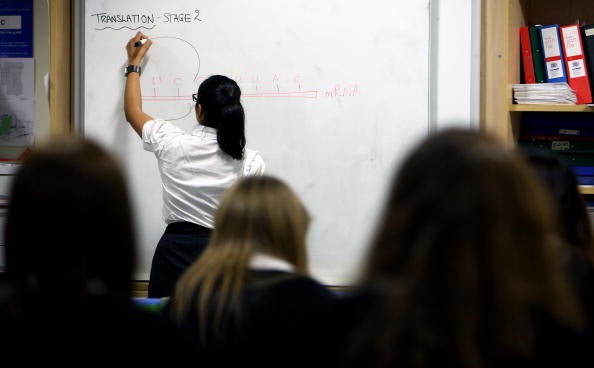Black and minority teachers face 'inherent racism' in UK schools, report warns
BME teachers 'more likely' to consider quitting the profession as a result of work-related illness and discrimination, as UK faces growing 'crisis' in teacher retention

Black and ethnic minority teachers in British schools are subject to “deep-rooted, endemic and institutionalised racism”, an extensive new report has warned.
More than twice the proportion of BME teachers (31 per cent) said they have experienced discrimination at work in the past year compared to their white peers.
The survey of 12,000 teachers, undertaken by the Nasuwt teaching union and the Runneymede Trust, found BME teachers were more likely to have suffered ill health as a result of work.
Almost eight in 10 BME teachers (79 per cent) believed that they were not paid at a level “commensurate with their skills and experiences”, and nearly two thirds had experienced "verbal abuse by pupils" compared to just over half (51 per cent) of their white counterparts.
The survey echoes that of similar findings from previous polls – and highlights that "everyday racism" is still commonplace within the sector.
"That the issue of racism in our schools remains of considerable concern 30 years after the seminal report on racial inequality in schools, Education for All, was published by Lord Swann is deeply worrying," the report said, citing a 1985 Government report..
A smaller poll of 450 BME teachers led by the union in 2015 found 54 per cent had been subject to discrimination or harassment at work because of their race or ethnicity.
The same survey revealed 62 per cent did not believe schools treated BME pupils fairly, and 60 per cent believed schools did not respect BME teachers.
Earlier this year, the NUT reported that BME teachers faced an "invisible glass ceiling" at work.
Dr Zubaida Haque, Research Associate at the Runnymede Trust, said: “The review of the evidence shows us that black and ethnic minority teachers are running into closed doors at almost every step of the way in a profession that is already beleaguered by funding cuts and red tape."
Amid a growing recruitment and retention crisis in teaching overall, Dr Haque said the shortage of BME teachers meant school staff did not reflect the increasing diversity of pupils.
“The combination of an ineffective government recruitment strategy and increasing career dissatisfaction among BME teachers suggests another broken social mobility promise for black and ethnic minority groups,” she added.
“And what kind of signal does it send to the British public and to the next generation of adults if trusted school leaders are indicating that there are different rules and opportunities for teachers from different ethnic backgrounds in the education system?”
According to the latest report, the majority of BME teachers (64 per cent) said they are unsatisfied with their job, and a higher proportion said they had considered leaving the profession (75 per cent compared to 64 per cent of white teachers) as a result.
Chris Keates, General Secretary of the Nasuwt, said: “Schools and pupils are losing out on the talents and skills of BME teachers who are unable to advance their careers or who opt for a different profession due to the barriers being placed in their way. If we want the best education for our children and young people we cannot afford to continue to let this happen.
“This report calls for a national conversation about racism in the education system, with all players, including Government, making a commitment to delivering real change to break down and root out racial discrimination.
“Whilst the Government has said that it wants to address racial inequality in the workplace, this report should be a call to action to tackle urgently the problem of racial inequality in schools.”
Join our commenting forum
Join thought-provoking conversations, follow other Independent readers and see their replies
Comments
Bookmark popover
Removed from bookmarks